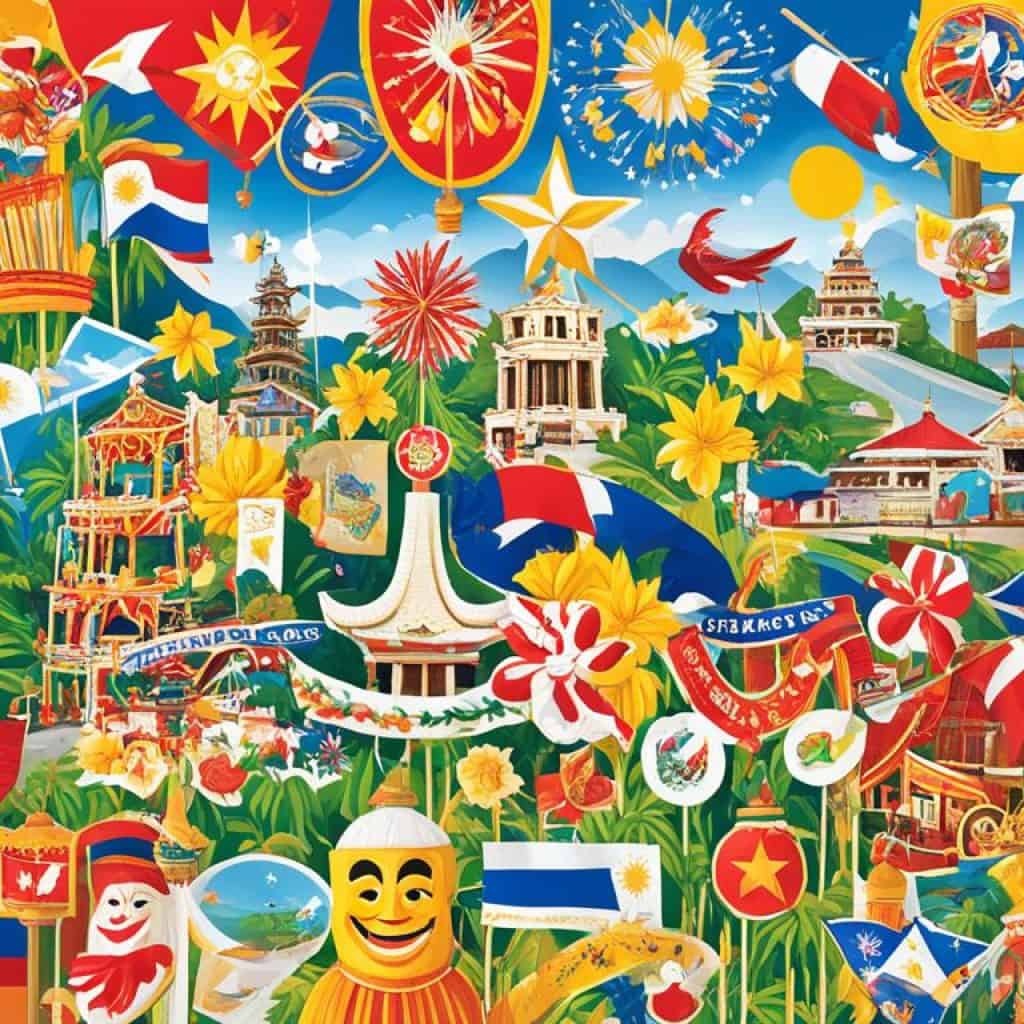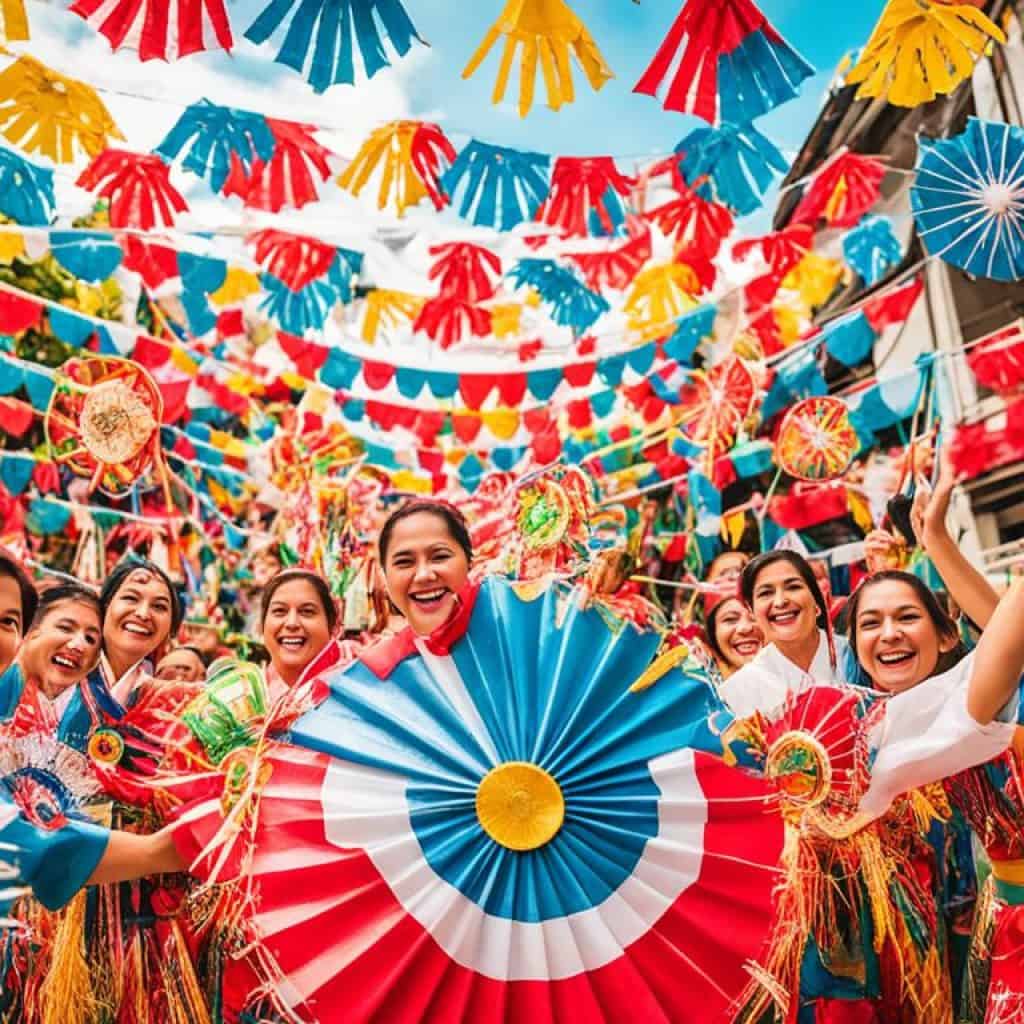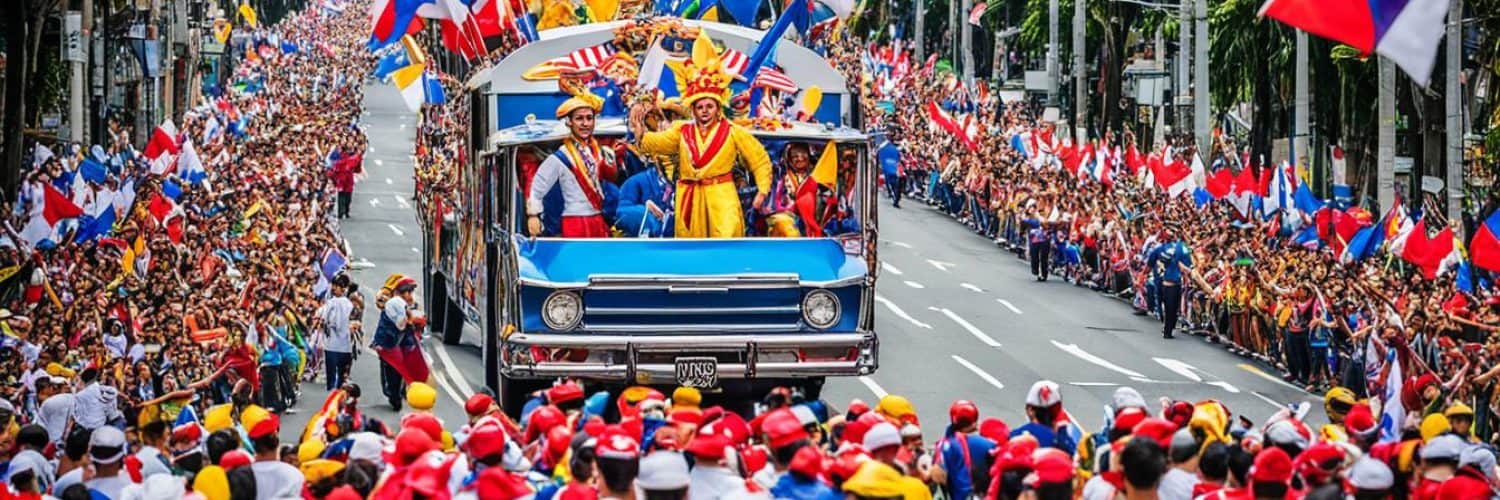Have you ever wondered if August 12, 2019, was a holiday in the Philippines? Did the whole nation come to a standstill or did life continue as usual? Let’s delve into this intriguing question and find out the truth about August 12, 2019, as a Philippine holiday.
Key Takeaways:
- August 12, 2019, held a special significance as a declared holiday in the Philippines.
- Eid’l Adha or the Feast of Sacrifice was observed on this day, honoring a meaningful Muslim celebration.
- Understanding the diverse range of holidays in the Philippines is crucial for planning purposes and cultural awareness.
Public Holidays in the Philippines
When it comes to public holidays, the Philippines has a rich calendar filled with celebrations and observances. These holidays play an essential role in the cultural and historical fabric of the nation, giving Filipinos the opportunity to commemorate significant events and spend quality time with their loved ones.
The Philippines recognizes two types of public holidays: regular holidays and special non-working days. Regular holidays, also known as “Red Letter Days,” have fixed dates and are widely observed throughout the country. On the other hand, special non-working days are flexible and can be moved to create long weekends or to honor specific events or occasions.
Regular holidays in the Philippines include New Year’s Day, Independence Day, Christmas Day, and others. These holidays mark pivotal moments in Philippine history and are deeply ingrained in the Filipino identity. They provide an opportunity for reflection, remembrance, and national pride.
Special non-working days, on the other hand, cater to unique circumstances or occasions. They include events such as Chinese New Year, EDSA Revolution Anniversary, and National Heroes Day. These holidays give Filipinos the chance to celebrate cultural diversity, promote unity, and recognize the contributions of significant individuals or groups within the country.
Public holidays in the Philippines are designated by the government and observed nationwide. They provide valuable time off for employees, students, and families to relax, engage in festivities, and strengthen bonds. Whether it’s a cherished tradition, a religious celebration, or a time for leisure, public holidays hold a special place in the hearts of Filipinos.
To give you a better understanding of the public holidays in the Philippines, here’s an overview of the regular holidays and special non-working days:
Regular Holidays
- New Year’s Day
- Independence Day
- Christmas Day
- And more
Special Non-Working Days
- Chinese New Year
- EDSA Revolution Anniversary
- National Heroes Day
- And more
Understanding the public holidays in the Philippines allows individuals and businesses to plan events, vacations, and activities more effectively. It also fosters a sense of unity and cultural appreciation among Filipinos across the nation.
History of Public Holidays in the Philippines
The history of public holidays in the Philippines dates back to 1987 when President Corazon Aquino introduced the Administrative Code of the Philippines. This code established a comprehensive list of nationwide regular holidays and special days, which are observed by Filipinos across the country.
However, it was in 2001 that President Gloria Macapagal Arroyo introduced a concept known as “Holiday Economics.” This innovative approach involved the strategic movement of celebration dates for holidays from midweek to weekends. The aim was to promote tourism and boost the economy by encouraging longer weekends and providing more opportunities for leisure and travel for both locals and tourists.
“Holiday Economics was designed to encourage more economic activities by providing opportunities for longer holidays.”
This concept was later codified in 2007 with Republic Act No. 9492, which replaced the previous list of holidays and special days. Under this law, the government has the authority to move the date of certain holidays to create long weekends or promote economic and cultural activities.
Since then, the history of public holidays in the Philippines has been shaped by a combination of traditional observances and the strategic planning of holiday dates to maximize their impact on the economy and society.

The Significance of “Holiday Economics”
By implementing “Holiday Economics,” the Philippine government aimed to strike a balance between celebrating important historical and cultural events while also stimulating economic growth. The strategic movement of holidays to weekends has allowed Filipinos to enjoy longer breaks and engage in travel and leisure activities, leading to increased tourism revenue and economic activity in various sectors.
Flexible Holiday Dates for Enhanced Celebrations
The ability to adjust holiday dates according to specific circumstances has also facilitated more meaningful and vibrant celebrations of important events. By ensuring that holidays fall on weekends, more individuals can actively participate in festivities and commemorative activities.
This approach has been particularly successful during major Philippine festivals, such as the Sinulog Festival in Cebu or the Panagbenga Festival in Baguio. With the strategic arrangement of holiday dates, these events can attract more visitors from both domestic and international destinations, providing a boost to local businesses and cultural exchanges.
Ensuring Vital Balance for a Dynamic Nation
The history of public holidays in the Philippines reflects the nation’s commitment to balancing tradition and progress. While traditional observances remain an integral part of the holiday calendar, the strategic planning of holiday dates underlines the government’s efforts to foster economic growth, promote tourism, and facilitate vibrant celebrations of Philippine culture and heritage.
Types of Holidays in the Philippines
The Philippines celebrates a variety of holidays, categorized into two types: regular holidays and special non-working days. Each type has its own unique characteristics and significance. Let’s explore the different types of holidays in the Philippines:
Regular Holidays
Regular holidays in the Philippines have fixed dates and are observed nationwide. These holidays hold great cultural and historical importance and are celebrated annually. Some examples of regular holidays include:
- New Year’s Day (January 1) – A time of new beginnings and reflection.
- Independence Day (June 12) – Commemorates the country’s freedom from foreign rule.
- Christmas Day (December 25) – Celebrates the birth of Jesus Christ and is a time of joy, giving, and family gatherings.
Special Non-Working Days
Special non-working days are movable holidays in the Philippines. These holidays are declared by the government to commemorate significant events, cultural traditions, and religious observances. Some examples of special non-working days include:
- Chinese New Year – Celebrated by the Filipino-Chinese community to welcome the lunar new year.
- EDSA Revolution Anniversary (February 25) – Commemorates the peaceful People Power Revolution that brought about democratic reforms in the country.
- Eid’l Fitr – Marks the end of Ramadan and is an important celebration for the Muslim community.
These holidays provide opportunities for Filipinos to come together, celebrate their rich cultural heritage, and reflect on their history and traditions.
| Type | Examples |
|---|---|
| Regular Holidays | New Year’s Day, Independence Day, Christmas Day, etc. |
| Special Non-Working Days | Chinese New Year, EDSA Revolution Anniversary, Eid’l Fitr, etc. |
Pay and Compensation for Holidays in the Philippines
Under the Labor Code of the Philippines, employees are entitled to pay and compensation for holidays based on whether they work or not. The specifics of pay rates vary depending on the type of holiday.
Regular Holidays
For regular holidays, employers are required to pay 100% of the daily wage to employees who did not work, and 200% of the daily wage to employees who worked on the holiday.
Special Non-Working Days
On special non-working days, employers must pay 100% of the daily wage to employees who did not work, and 130% of the daily wage to employees who worked on the holiday.
This compensation policy ensures that employees are fairly remunerated for their time and dedication, encouraging a healthy work-life balance. It also incentivizes employers to provide necessary staffing during holidays, ensuring uninterrupted services for customers and clients.
Here is a breakdown of the pay and compensation rates for holidays in the Philippines:
| Holiday Type | Pay for Employees Who Did Not Work | Pay for Employees Who Worked |
|---|---|---|
| Regular Holidays | 100% of the daily wage | 200% of the daily wage |
| Special Non-Working Days | 100% of the daily wage | 130% of the daily wage |
It’s important for both employers and employees to be aware of these compensation regulations to ensure fair treatment and compliance with the Labor Code. Employers should properly calculate and disburse holiday pay, while employees should be familiar with their entitlements to avoid any misunderstandings.
Note: The information provided here is based on the Labor Code of the Philippines as of the time of writing. It is always advisable to consult the latest labor laws and regulations for accurate and up-to-date information.

Former Holidays in the Philippines
Throughout history, the Philippines has seen changes in its holiday calendar. Notably, Independence Day, which was once celebrated on July 4th, has undergone a significant transformation. Originally marking the country’s independence from the United States, Independence Day was later moved to June 12th, commemorating the declaration of freedom and independence.
Similarly, Philippine-American Day, previously observed on November 15th, has evolved into Philippine-American Friendship Day. This holiday was shifted to coincide with July 4th, symbolizing the enduring friendship between the Philippines and the United States. These changes reflect the dynamic nature of the country’s celebrations and its commitment to honoring its history and relationships.
“The history of our holidays is a testament to our rich heritage and the value we place on freedom and friendship.”
Former Holidays in the Philippines:
| Holiday | Previous Date | New Date |
|---|---|---|
| Independence Day | July 4th | June 12th |
| Philippine-American Day | November 15th | July 4th |
This table provides a summary of the former holidays in the Philippines and the changes that have occurred over time.
These modifications in holiday dates reflect the country’s continuous development and its commitment to commemorating significant events in an inclusive and meaningful way. As the Philippines progresses, it remains rooted in its past while embracing a future of unity and cultural diversity.
Regular Non-Working Holidays in the Philippines
The Philippines observes several regular non-working holidays throughout the year, providing Filipinos with the opportunity to celebrate and reflect on significant events and milestones in Philippine history and culture. These holidays hold great importance and serve as reminders of the nation’s rich heritage and diverse traditions.
- New Year’s Day: Celebrated every January 1st, this holiday marks the beginning of the year and is a time for reflection, gratitude, and setting new goals.
- Independence Day: Held on June 12th, this holiday commemorates the Philippines’ declaration of independence from Spanish colonial rule in 1898.
- Labor Day: Celebrated every May 1st, this holiday honors the contributions and achievements of workers in the Philippines and around the world.
- Christmas Day: Observed on December 25th, Christmas Day is a joyous holiday celebrated by Filipinos of all backgrounds, symbolizing love, peace, and unity.
These regular non-working holidays provide individuals and families with precious moments to come together, relax, and participate in various cultural and religious activities. Whether it’s attending festive parades, enjoying traditional meals, or spending quality time with loved ones, these holidays play a vital role in strengthening the bonds of community and fostering a sense of national pride.

Special Non-Working Holidays in the Philippines
Special non-working holidays in the Philippines are designated to mark specific events or celebrations and are observed nationwide. These holidays provide an opportunity for Filipinos to commemorate and reflect on important occasions in the country’s history and culture.
Chinese New Year
Chinese New Year, also known as the Lunar New Year or Spring Festival, is a special non-working holiday in the Philippines. It is celebrated by the Filipino-Chinese community and marks the beginning of the lunar calendar. This holiday is a time for family gatherings, feasts, and traditional activities such as dragon and lion dances.
EDSA Revolution Anniversary
The EDSA Revolution Anniversary is another special non-working holiday in the Philippines. It commemorates the People Power Revolution, a peaceful uprising in 1986 that led to the downfall of the authoritarian regime. This holiday serves as a reminder of the Filipino people’s resilience and their pursuit of democracy.
National Heroes Day
National Heroes Day is a special non-working holiday that honors the courage and sacrifices of Filipino heroes who played significant roles in shaping the country’s history. It is a day to recognize the contributions of national heroes and to inspire the current generation to embody the values of heroism and nationalism.
| Holiday | Date |
|---|---|
| Chinese New Year | Varies (based on the lunar calendar) |
| EDSA Revolution Anniversary | February 25 |
| National Heroes Day | Last Monday of August |
These special non-working holidays hold immense cultural and historical significance in the Philippines. They provide moments of reflection, celebration, and unity for Filipinos across the nation.
Eid’l Adha and August 12, 2019
President Rodrigo Duterte declared August 12, 2019, as a regular holiday nationwide in observance of Eid’l Adha or the Feast of Sacrifice. Eid’l Adha is one of the two most important holidays on the Muslim calendar, and it had an impact on holiday celebrations and events across the nation.
President Duterte’s declaration of August 12, 2019, as a holiday in celebration of Eid’l Adha reflects the Philippines’ commitment to religious diversity and inclusion. This holiday holds great significance for Muslims, as it commemorates the willingness of Ibrahim (Abraham) to sacrifice his son as an act of obedience to God. It is a time for Muslims to come together in prayer, reflection, and community.
Eid’l Adha is a time of sacrifice and generosity, with Muslims performing the ritual sacrifice of an animal as an act of devotion and charity. Families and communities gather to share meals and engage in acts of service to those in need. It is a time to honor and remember the values of sacrifice, empathy, and compassion.
The declaration of August 12, 2019, as a holiday allowed for the nationwide celebration of Eid’l Adha, enabling Muslims in the Philippines to observe this important religious occasion without hindrance. It also provided an opportunity for people of different faiths to learn about and appreciate the rich cultural heritage of the Muslim community.
During Eid’l Adha, various events and activities took place across the country, including prayer gatherings, feasts, and charitable initiatives. These celebrations fostered unity, understanding, and solidarity among Filipinos of diverse beliefs.
Eid’l Adha is a time for reflection, gratitude, and coming together as a community. It serves as a reminder of the importance of religious freedom, tolerance, and respect for all faiths in the Philippines. The declaration of August 12, 2019, as a holiday in honor of Eid’l Adha demonstrates the country’s commitment to upholding the rights and traditions of its Muslim population.
Holiday Calendar in the Philippines
In the Philippines, the holiday calendar is filled with both regular and special non-working holidays. These holidays hold great significance and are celebrated nationwide, reflecting the rich history, diverse culture, and religious traditions of the country.
Regular holidays are fixed dates that mark important events, such as New Year’s Day, Independence Day, and Christmas Day. On these occasions, people come together to commemorate and celebrate these significant milestones.
Special non-working holidays, on the other hand, are movable dates that are designated to honor specific events or celebrations. These include holidays like Chinese New Year, EDSA Revolution Anniversary, and National Heroes Day, which provide opportunities for Filipinos to come together and pay tribute to their heritage.
“Holidays are a time to reconnect with our roots, celebrate our shared history and culture, and strengthen the bonds of our diverse society.” – Celebrating the Philippines
To further illustrate the variety and richness of the holiday calendar in the Philippines, here is a table showcasing some of the notable holidays and their corresponding dates:
| Holiday | Date |
|---|---|
| New Year’s Day | January 1 |
| Chinese New Year | February (varies) |
| EDSA Revolution Anniversary | February 25 |
| Maundy Thursday | Thursday before Easter |
| Good Friday | Friday before Easter |
| Labor Day | May 1 |
| Independence Day | June 12 |
| Christmas Day | December 25 |
As you can see, the holiday calendar in the Philippines is a vibrant tapestry of cultural celebrations, historical commemorations, and religious observances. It provides opportunities for Filipinos to come together, cherish their shared heritage, and create lasting memories with loved ones.
Future Holiday Dates in the Philippines
Looking ahead, the Philippines has a variety of upcoming holidays scheduled from March to November 2024. These holidays are important dates in the country’s calendar, celebrated nationwide with enthusiasm and joy. Whether you’re planning a vacation or simply looking forward to enjoying some time off, here are some of the future holiday dates you can mark on your calendar:
- March Equinox
- Maundy Thursday
- Good Friday
- Black Saturday
- Easter Sunday
- The Day of Valor
- Eidul-Fitar
- Labor Day
- Independence Day
These upcoming holidays provide opportunities for individuals and families to celebrate, relax, and engage in various cultural and religious activities. Whether you prefer to spend quality time with loved ones, explore the country’s diverse traditions, or embark on exciting adventures, these future holiday dates in the Philippines offer something for everyone.
Quoting Someone
“Holidays are special occasions that allow us to cherish and celebrate the things that matter most in life.”
| Holiday | Date | Type |
|---|---|---|
| March Equinox | March 21, 2024 | Regular Holiday |
| Maundy Thursday | April 4, 2024 | Regular Holiday |
| Good Friday | April 5, 2024 | Regular Holiday |
| Black Saturday | April 6, 2024 | Regular Holiday |
| Easter Sunday | April 7, 2024 | Regular Holiday |
| The Day of Valor | April 9, 2024 | Regular Holiday |
| Eidul-Fitar | TBD | Special Non-Working Holiday |
| Labor Day | May 1, 2024 | Regular Holiday |
| Independence Day | June 12, 2024 | Regular Holiday |
Conclusion
Based on the information gathered, it can be concluded that August 12, 2019, was a declared holiday in the Philippines in observance of Eid’l Adha. This holiday is of significant importance to the Muslim community and has an impact on holiday celebrations and events across the nation.
The Philippines has a diverse range of holidays, both regular and special, that commemorate various historical, cultural, and religious events. These holidays play an important role in the lives of Filipinos, fostering national pride and unity. It is essential for individuals and businesses to be aware of these holidays for planning purposes, including scheduling vacations, organizing events, and managing workloads.
Understanding the significance of each holiday and respecting the customs and traditions associated with them is key to building strong relationships and fostering a sense of inclusivity within the Filipino society. Whether it is celebrating New Year’s Day, commemorating Independence Day, or observing religious holidays, the richness and diversity of the Philippines’ holiday calendar contribute to the vibrant tapestry of the nation’s culture and heritage.


















Add comment